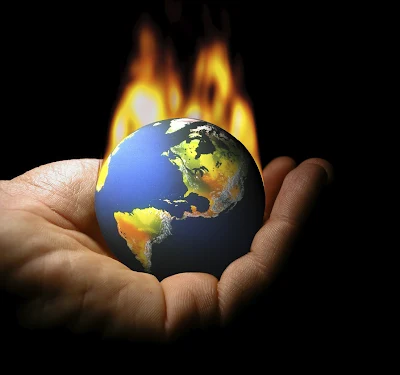Tonight in Mexico the Climate Reality Project begins its 24 hours of continuous presentations on the reality of the Climate Crisis--a new presentation in a different part of the world, as each time zone reaches 7 p.m. It all ends with Al Gore's presentation in New York City at 7 p.m. tomorrow, September 15. Here's the Grist explanation and tool for following it.
I can't say I've been overly impressed so far by what's been produced as preview, but I'm not the audience for this, nor am I the demographic it seems primed to reach, with all its emphasis on Facebook, Twitter, etc. But I'll be interested in what it comes up with.
As a preview of his own presentation, Al Gore talked to the Washington Post. He ascribes the steps backward in acceptance of Climate Crisis reality to the very well funded disinformation campaign run by the folks who brought us smoking is good for you. That's undoubtedly a big part of it, especially because it works with the desire in all of us not to want global heating and its inevitable effects to be true. But the visceral violence of denial is becoming proportional to the visible signs of the Climate Crisis. So another crisis is coming.
Gore confronts other questions in this interview, and states his reason for this project: "But my message is about presenting the reality. I have faith in the United States and our ability to make good decisions based on the facts. And I believe Mother Nature is speaking very loudly and clearly. We’ve had ten disasters in the United States this year alone costing more than $1 billion and which were climate-related. It’s only a matter of time before reality sinks in, and we need both parties involved. And the only way to get the right answer is to understand the question."
The question about the information to be presented in these 24 hours is how to get beyond the same old same old, assuming that a whole lot of new people aren't more receptive to more of the same. I think messages like this with something new in them would help (also from this interview): The interviewer notes that scientists are much more willing to say there's a link between our many climate disasters and the causes of the Climate Crisis. Gore agrees, saying: "As scientists like James Hansen [of NASA’s Goddard Institute for Space Studies] and Kevin Trenberth [of the National Center for Atmospheric Research] point out, the changes brought about by man-made global-warming pollution have reached the stage that every event is now being affected by it in some way."
Starting With Stoppard
-
Tom Stoppard died in November 2025. From his first success in the late
1960s--*Rosencrantz and Gildenstern Are Dead-*- to now, I followed his
career and...
4 days ago















